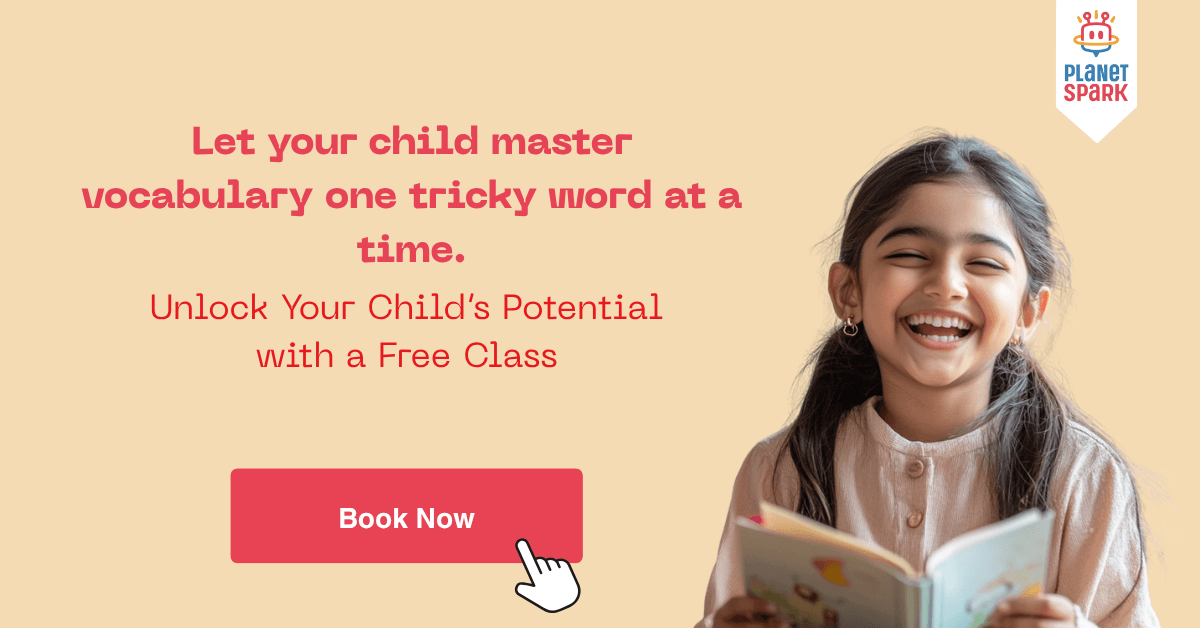Difficult Words in English for Kids

Does your child struggle with difficult words in the English language? Whether they’re trying to write an essay, read a book, or speak confidently in class, having a strong vocabulary makes all the difference. Just learning 5–10 new words a week can make your child more expressive, confident, and creative.
A rich vocabulary isn’t just for adults or language lovers. It's essential for school kids, especially when they begin building their communication and public speaking skills.
At PlanetSpark, we help children master vocabulary through storytelling, games, and one-on-one guidance from expert trainers. But even before joining a course, you can help your child get a head start with this A to Z list of difficult English words made simple and fun.
Let’s dive in!
A–Z Difficult Words in English for Kids (With Meanings and Examples)
Let’s explore an alphabetical list of hard English words that are often confusing for kids, along with meanings and usage in simple sentences.
Difficult Words in English Starting with A
| Word | Meaning | Example Sentence |
|---|---|---|
| Abandon | To leave behind or give up | The captain had to abandon the sinking ship. |
| Abrupt | Sudden or unexpected | His abrupt answer surprised everyone. |
| Absurd | Silly or unreasonable | The idea of cats flying planes is absurd. |
| Abundant | A large quantity of something | We have an abundant supply of fresh water. |
| Adore | To love deeply and respect | I adore my grandparents. |
| Ambition | A strong desire to achieve | Her ambition is to become a scientist. |
| Apologize | To say sorry | He had to apologize for breaking the window. |
Difficult Words in English Starting with B
| Word | Meaning | Example Sentence |
| Banish | To send someone away | The king decided to banish the traitor. |
| Bewilder | To confuse someone | The tricky puzzle can bewilder young kids. |
| Blunder | A big mistake | He made a blunder by forgetting his homework. |
| Boast | To talk proudly about yourself | She boasted about winning the race. |
| Brisk | Quick and energetic | They took a brisk walk in the evening. |
| Brittle | Hard but easy to break | The candy was sweet but very brittle. |
| Burden | A heavy load or responsibility | Taking care of the sick pet felt like a burden. |
Difficult Words in English Starting with C
| Word | Meaning | Example Sentence |
| Candid | Honest and open | She gave a candid answer about her mistakes. |
| Cease | To stop something | The rain ceased after a few hours. |
| Chaos | Complete confusion and disorder | There was chaos in the class when the teacher left. |
| Cautious | Very careful | Be cautious when crossing the road. |
| Clarity | Being clear | His explanation lacked clarity. |
| Collapse | To fall down suddenly | The old bridge might collapse any day. |
| Confess | To admit something wrong | He confessed to eating the last cookie. |

Book a Free Demo Class Today
Experience how PlanetSpark makes learning tough English words fun and easy: for free!
Difficult Words in English Starting with D
| Word | Meaning | Example Sentence |
| Daring | Brave and fearless | The daring boy climbed the tall tree. |
| Deceive | To trick someone | Don't deceive your friends. |
| Dilemma | A hard choice to make | She faced a dilemma about which game to buy. |
| Diminish | To become smaller or less | His fear began to diminish after a while. |
| Disguise | To hide the real identity | He wore a disguise to the party. |
| Drenched | Completely wet | I got drenched in the rain without an umbrella. |
| Durable | Long-lasting and strong | This bag is mad |
Difficult Words in English Starting with E
| Word | Meaning | Example Sentence |
| Elaborate | To explain in detail | She asked him to elaborate on his idea. |
| Emerge | To come out or appear | A butterfly emerged from the cocoon. |
| Endure | To suffer patiently | He had to endure the long wait. |
| Envious | Feeling jealous | She felt envious of her friend's new dress. |
| Errand | A short trip to do a task | I went on an errand to buy groceries. |
| Evaluate | To judge or assess | The teacher will evaluate our project work. |
| Exhausted | Very tired | After running, I felt completely exhausted. |
Difficult Words in English Starting with F
| Word | Meaning | Example Sentence |
| Fascinate | To attract strongly | Dinosaurs fascinate many kids. |
| Feeble | Weak or lacking strength | His voice was too feeble to hear. |
| Fiction | Made-up story | She loves reading fiction books. |
| Flawless | Perfect, without error | Her handwriting is flawless. |
| Forbid | To not allow | They forbid using phones in class. |
| Fracture | A broken bone | He got a fracture in his arm. |
| Furious | Very angry | She was furious when she saw the mess. |
Difficult Words in English Starting with G
| Word | Meaning | Example Sentence |
| Generous | Willing to give and share | He is generous with his time and money. |
| Genuine | Real or true | This is a genuine diamond. |
| Glimpse | A quick look | I got a glimpse of the shooting star. |
| Gloomy | Sad or dark | The weather was gloomy and cold. |
| Grumble | To complain in a low voice | He began to grumble about the homework. |
| Guardian | A person who protects or watches | Her uncle is her legal guardian. |
| Gusty | Windy | It was a gusty day with strong winds. |
Difficult Words in English Starting with J
| Word | Meaning | Example Sentence |
|---|---|---|
| Jeopardy | Danger or risk | His life was in jeopardy. |
| Jubilant | Feeling or expressing great joy | The team was jubilant after the win. |
| Judicious | Showing good judgment | She made a judicious choice. |
| Jargon | Special words used by a group | Doctors often use medical jargon. |
| Justify | To prove something is right | Can you justify your actions? |
| Jostle | To push or bump roughly | People jostled in the crowded market. |
| Jaded | Tired or bored from too much | He felt jaded after hours of studying. |
Step into a new learning journey!
Book a free demo now
Difficult Words in English Starting with K
| Word | Meaning | Example Sentence |
|---|---|---|
| Keen | Eager or enthusiastic | She has a keen interest in music. |
| Kindle | To start or spark | The teacher kindled our curiosity. |
| Knack | A natural talent or skill | He has a knack for storytelling. |
| Knowledgeable | Well-informed or educated | She is knowledgeable about wildlife. |
| Knead | To press or mix with hands | Knead the dough properly. |
| Kudos | Praise or recognition | Kudos to you for finishing the project! |
Difficult Words in English Starting with L
| Word | Meaning | Example Sentence |
|---|---|---|
| Lavish | Rich or luxurious | They had a lavish wedding. |
| Lethargic | Very tired or slow | I feel lethargic today. |
| Legitimate | Lawful or proper | That’s a legitimate concern. |
| Lucrative | Making a lot of money | It’s a lucrative business. |
| Linger | To stay longer than needed | The smell lingered in the room. |
| Luminous | Giving off light | The moon looked luminous tonight. |
| Lenient | Not strict | The teacher was lenient with late homework. |
Difficult Words in English Starting with M
| Word | Meaning | Example Sentence |
|---|---|---|
| Malicious | Intending to harm | That was a malicious rumour. |
| Meander | To wander aimlessly | We meandered through the garden. |
| Meticulous | Very careful and detailed | She is meticulous about her homework. |
| Mundane | Ordinary or dull | His job felt mundane. |
| Mystify | To confuse or puzzle | The trick mystified everyone. |
| Magnanimous | Generous and forgiving | He was magnanimous in victory. |
| Mournful | Very sad | She had a mournful expression. |
Difficult Words in English Starting with N
| Word | Meaning | Example Sentence |
|---|---|---|
| Naive | Lacking experience or wisdom | Don’t be so naive. |
| Nostalgic | Feeling fondly about the past | She felt nostalgic about her childhood. |
| Negligent | Careless, not paying attention | The fire was caused by a negligent worker. |
| Notorious | Famous for something bad | He’s notorious for breaking rules. |
| Nurture | To care for and help grow | Parents nurture their children. |
| Nudge | To gently push | She gave him a nudge to wake up. |
| Nifty | Clever or useful | That’s a nifty gadget! |
Difficult Words in English Starting with O
| Word | Meaning | Example Sentence |
|---|---|---|
| Oblivious | Not aware of something | He was oblivious to the noise. |
| Obscure | Unclear or hard to understand | The book had an obscure meaning. |
| Ominous | Threatening or scary | The clouds looked ominous. |
| Outlandish | Strange or unusual | He wore an outlandish costume. |
| Overwhelm | To overpower emotionally | She was overwhelmed with joy. |
| Optimistic | Hopeful and confident | I’m optimistic about the results. |
| Ostentatious | Showy or flashy | Their house was too ostentatious. |
Difficult Words in English Starting with P
| Word | Meaning | Example Sentence |
|---|---|---|
| Peculiar | Strange or odd | That’s a peculiar sound. |
| Perplex | To confuse deeply | The riddle perplexed us. |
| Pristine | Perfect and unspoiled | The beach was pristine and quiet. |
| Pessimist | Someone who sees the bad side | A pessimist always expects the worst. |
| Profound | Deep or meaningful | Her words had a profound impact. |
| Punctual | Always on time | He is always punctual. |
| Procrastinate | To delay doing something | Don’t procrastinate your homework. |
Difficult Words in English Starting with Q
| Word | Meaning | Example Sentence |
|---|---|---|
| Quench | To satisfy thirst | Water quenched his thirst. |
| Quaint | Old-fashioned in a nice way | They stayed in a quaint little cottage. |
| Quiver | To shake slightly | Her hands quivered from fear. |
| Query | A question | He had a query about the lesson. |
| Quell | To calm or stop | The teacher quelled the noise quickly. |
| Quota | A fixed share or amount | We met our sales quota this month. |
| Quarantine | Isolation to prevent spreading illness | He was in quarantine for 7 days. |
Difficult Words in English Starting with R
| Word | Meaning | Example Sentence |
|---|---|---|
| Rambunctious | Wild and noisy | The children were rambunctious at the party. |
| Radiant | Bright and glowing | She had a radiant smile. |
| Reluctant | Unwilling or hesitant | He was reluctant to speak in public. |
| Resilient | Able to recover quickly | She is a resilient student. |
| Reprimand | To scold or correct | The teacher reprimanded the class. |
| Ruthless | Cruel or without pity | The villain was ruthless. |
| Reclusive | Avoiding other people | The author lived a reclusive life. |

Ready for your child to speak fluently and fearlessly?
Book a free demo
Difficult Words in English Starting with S
| Word | Meaning | Example Sentence |
|---|---|---|
| Serene | Calm and peaceful | The lake looked serene in the morning. |
| Skeptical | Doubting or questioning | He was skeptical of the story. |
| Subtle | Not obvious | There was a subtle change in her tone. |
| Sulk | To be silently angry | She began to sulk when scolded. |
| Sympathetic | Showing care or understanding | The nurse was very sympathetic. |
| Surpass | To do better than | She surpassed everyone’s expectations. |
| Spontaneous | Done without planning | They took a spontaneous trip. |
Difficult Words in English Starting with T
| Word | Meaning | Example Sentence |
|---|---|---|
| Tactful | Careful not to offend | He gave tactful advice. |
| Tenacious | Not giving up easily | She is tenacious in her goals. |
| Turmoil | Great confusion or disorder | The country was in turmoil. |
| Tedious | Boring and long | The task was tedious. |
| Tranquil | Peaceful and quiet | The forest was tranquil. |
| Thrive | To grow or succeed | The plants thrive in sunlight. |
| Treacherous | Dangerous or deceptive | The road was treacherous during rain. |
Difficult Words in English Starting with U
| Word | Meaning | Example Sentence |
|---|---|---|
| Uncanny | Strange in an unsettling way | He had an uncanny ability to guess. |
| Unravel | To untangle or solve | We need to unravel the mystery. |
| Upbeat | Cheerful and positive | She always stays upbeat. |
| Ubiquitous | Found everywhere | Mobile phones are ubiquitous now. |
| Undermine | To weaken secretly | He tried to undermine my confidence. |
| Unkempt | Messy or not neat | His hair looked unkempt. |
| Urgency | Needing quick action | The situation requires urgency. |
Difficult Words in English Starting with V
| Word | Meaning | Example Sentence |
|---|---|---|
| Valiant | Brave and courageous | The valiant firefighter saved the kitten. |
| Venture | A risky or daring journey | We went on a venture into the jungle. |
| Vivid | Bright, clear, and detailed | She painted a vivid picture of the sunset. |
| Verdict | A decision in a court of law | The jury reached a verdict after two days. |
| Vanish | To disappear suddenly | The magician made the rabbit vanish. |
Difficult Words in English Starting with W
| Word | Meaning | Example Sentence |
|---|---|---|
| Wander | To move around without a clear purpose | I love to wander through the forest. |
| Whimsical | Playful or amusing | The whimsical story made the kids laugh. |
| Withstand | To resist or endure | The house can withstand strong winds. |
| Wretched | Very bad or miserable | He felt wretched after losing his toy. |
| Wary | Cautious or careful | Be wary of strangers offering candy. |
Difficult Words in English Starting with X
| Word | Meaning | Example Sentence |
|---|---|---|
| Xenial | Friendly to guests | The host was very xenial and kind. |
| Xenophobia | Fear or dislike of people from other countries | We should fight xenophobia with kindness. |
| Xerophyte | A plant that survives in dry areas | The cactus is a common xerophyte. |
| Xylography | Art of engraving on wood | Xylography was used to print books in old times. |
| Xylophone | A musical instrument with wooden bars | She played a song on the xylophone. |
Difficult Words in English Starting with Y
| Word | Meaning | Example Sentence |
|---|---|---|
| Yearn | To want something strongly | I yearn to visit the mountains. |
| Yonder | Over there (at a distance) | Look at the castle yonder on the hill. |
| Yell | To shout loudly | The coach began to yell instructions. |
| Yield | To give in or produce something | Apple trees yield fruit in summer. |
| Youthful | Young or having qualities of youth | Her energy was very youthful. |
Difficult Words in English Starting with Z
| Word | Meaning | Example Sentence |
|---|---|---|
| Zeal | Great enthusiasm | She worked with zeal to win the prize. |
| Zenith | The highest point | He reached the zenith of his career. |
| Zany | Amusingly silly or foolish | The clown had a zany sense of humor. |
| Zigzag | A line with sharp turns | The path went in a zigzag through the woods. |
| Zest | Excitement or enjoyment | He tackled the project with great zest. |
Book a free demo and unlock a future full of confident conversations!
Why Is It Important to Learn Difficult Words in English?
Learning difficult words in English is not just about improving vocabulary. It helps children become better communicators, builds confidence, and supports overall academic success. Here’s why every child should focus on growing their word bank:
Builds Strong Communication Skills
When children learn new words, they can express their thoughts more clearly. It helps them speak with confidence and explain their ideas better in class or during conversations.
Improves Reading and Understanding
Difficult words often appear in storybooks, school lessons, and exams. Knowing what these words mean helps children read faster and understand the text without getting confused.
Makes Writing More Creative
With a rich vocabulary, children can write essays, stories, and poems that are more interesting. They can describe people, places, and emotions in a better way.
Helps in Exams and Competitions
Having a strong vocabulary gives students an advantage in school tests, English Olympiads, and spelling bees. They can answer more confidently and score better.
Supports Public Speaking
Whether it’s a speech, storytelling, or a class presentation, the right words help children speak smoothly and impress their listeners.
Encourages a Love for Learning
Learning new words makes children more curious. It encourages them to ask questions, read more books, and become lifelong learners.
What Makes a Word Difficult for Kids?
Not every difficult word in English is long or complicated. In fact, some short and simple-looking words can confuse children just as much as big, unfamiliar ones. What really makes a word difficult for kids is how tricky it is to spell, pronounce, or understand.
Here are the common reasons why certain words feel challenging:
1. Silent Letters
Some words include letters that are not pronounced at all. This can be confusing for children who are learning to sound out every letter.
Example: Knight – The “k” is silent, but it changes the way the word looks.
Other examples: Wrist, gnome, thumb
2. Spelling Doesn’t Match the Pronunciation
In English, many words are not spelled the way they sound. This makes it harder for kids to read or spell them correctly.
Example: Colonel – It is pronounced “kernel,” which sounds nothing like its spelling.
Other examples: Bologna, Wednesday, Debris
3. Words That Sound the Same but Mean Different Things
These are called homophones, and they often confuse young learners.
Example: Bare (without covering) vs. Bear (the animal)
Other examples: Right and Write, Two and Too, Sea and See
4. Rarely Used Words
Some words are difficult simply because kids don’t hear them often in daily life.
Example: Benevolent – A lovely word meaning “kind,” but rarely used in regular conversations.
Other examples: Intricate, Reluctant, Frantic
Book a free demo and discover how fun learning difficult words can be!
Why It Matters
When children understand why a word feels difficult, it helps remove the fear around it. They become curious instead of frustrated. Rather than avoiding these words, they begin to explore them, ask questions, and even try to use them in their own sentences.
Helping kids decode difficult words gives them:
- A sense of achievement
- Better reading and writing skills
- More confidence in expressing themselves

How PlanetSpark Helps Kids Learn Difficult English Words
At PlanetSpark, children do not just memorise tough words. They learn to use them confidently in both speech and writing.
- Spoken English classes help kids speak fluently using new words through role plays, everyday conversations, and instant trainer feedback.
- Public speaking training builds confidence and teaches expressive vocabulary for speeches, debates, and storytelling.
- Creative writing programs introduce advanced words through poems, short stories, and essays. Children then improve their drafts through guided feedback.
- Grammar and vocabulary sessions teach children how to use difficult words correctly in sentences and conversations.
With personalised coaching, real-time practice, AI tools, and interactive peer learning, PlanetSpark makes vocabulary learning fun, useful, and long-lasting.
Conclusion
Learning difficult words in English is not just for improving vocabulary. It helps children speak, read, and write more effectively. With the right support, even tricky words become easy to understand and fun to use. Whether your child is preparing for a speech, a writing task, or a conversation, a strong vocabulary gives them the confidence to express themselves clearly.
Start small, keep practicing, and explore real-world usage of new words. Tools like PlanetSpark’s courses make this journey smoother by blending speaking, writing, and vocabulary in one engaging program.
Frequently Asked Questions (FAQs)
1. What are difficult words in English for kids?
Difficult words are those that children find hard to understand, pronounce, spell, or use in sentences. They may include words with silent letters, unusual spellings, or rarely used terms.
2. How can I help my child remember difficult words?
Use word games, flashcards, storytelling, and daily conversations. Encourage your child to read and use the words in real-life situations. Repetition and usage help with retention.
3. Should kids learn tough vocabulary at an early age?
Yes, but gradually. Introducing new words in a fun and meaningful way helps children build a strong foundation without feeling overwhelmed.
4. What if my child mispronounces or misuses difficult words?
That is part of the learning process. Offer gentle correction and ask them to use the word again in another sentence. Practice and patience go a long way.
5. Can PlanetSpark help with vocabulary building?
Yes. PlanetSpark’s programs are designed to teach vocabulary through speaking, writing, and grammar practice. Children learn how to use difficult words confidently in real contexts.
Personalized Communication Report
Record a video to get a AI generated personalized communication report for your child

Hi There, want to try these
tips for your child with
LIVE with our expert coach?
Let's check your child's
English fluency